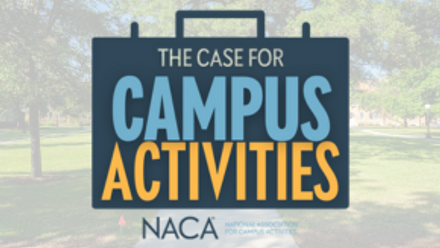Advice for New Directors
Earlier this school year, an anonymous poster to a social media community centered around student activities asked for advice as a new director. In reading through it, I was wishing that it wasn’t anonymous because it garnered some spectacular advice and I worried was anonymous because people often are fearful of asking for advice when starting something new. However, we have so much to learn from one another so asking for advice should never be something that someone should be ashamed of. We should be celebrating those willing to ask and invest in themselves through the time it takes to learn and incorporate advice into their daily work.
Following the post, I found myself thinking a lot about one piece of advice in particular that came from Cindy Kane, a long-time NACA volunteer and trusted colleague. She wrote about how directors needed to spend their time making systems instead of just solving one off problems. Even as a director who had been in my position for almost seven years, I appreciated reading that advice and carried it forward with me.
In the weeks and months to come, I found myself thinking about that post every once in a while. It sparked an idea to collect advice from current and former campus activities directors and associate members. This blog includes reflection from over 200 years of collective wisdom from 14 current or former campus activities directors and collectively, is my advice to you: when you don’t know, ask for help. There are experts in NACA and at your institution invested in your personal development. Take the time to get to know them and their experiences- they are always willing to lend their wisdom to those who will listen.
Dr. Cindy Kane - Assistant Provost for Strategic Initiatives, Bridgewater State University (MA)
- Don’t forget that a big part of your role as director is to not just solve problems for individual students, but to build systems and cultures that help to make sure those problems doing get repeated going forward. When you hear people use the term “big picture thinking,” this is one example of where your scope needs to be bigger when you become a director.
- When you become a director, your “circle of trust” may have to shift away from the staff group you are used to. Be proactive about nurturing that new circle early, because once something difficult happens you want to be sure that you have people you can turn to for the tough conversations. In short, nurture that network before you need it.
Ebony Ramsey, PhD - Assistant Dean for Student Involvement, Maryville University (MO)
As a new person on any team, you need to come in with a mindset of learning and observing. Try your best not to refer too much to your previous experiences, but if you have to, do so in a way that still allows space for you to take in the environment and campus culture that you are still learning. The best advice I have been given, is to come to work “vanilla” and let the sprinkles be put on you. To me that meant, come into work with a desire to be nimble, but allow the nuances of your observations and learning be the way that you can contribute to the changes that you eventually will become a part of.
Adam Frank - Dean of Student Life, Westchester Community College (NY)
Don’t be a robot. No one is hiring you to try to play a part or be someone other than who you are. It’s great to model your actions after Directors who came before you, but don’t make yourself a carbon copy of anyone. Lead in the same way we advise our students to – with your own authentic voice. Oh, and don’t forget to be open to learn and change. Being the head of a department still doesn’t mean you should know all the answers.
Tim Johnson - Director of the Guerrieri Student Union & Student Involvement, Salisbury University (MD)
Being a new director within Student Activities is both exciting and nerve-racking! It is important to remember that you are a programmer, event curator, and professional problem solver all in one, as that is what got you to this point. Never lose touch with students as they will also be your greatest walking assessment and feedback pool. Model healthy work habits for your new team, as you remember what it was like to balance those long hours/days. Find every opportunity to develop your staff as well as BE developed. Increasing those skills will only benefit you in the long run. Lastly, keep the job fun! What we do has a lasting impression so let’s at least make it a fun and memorable one!
Kate Magill - President, Sophie K
I had emailed a new advisor and her institution hadn’t done a comedy show in a long time. So she was tasked with this when she started. And she read my email about comedians in her area and asked to set up a zoom call with me. Which I think was a very smart move on her part, she could ask me the list of questions that she had prepared and she could speak with me while watching my face and seeing how I responded. I think you can tell a lot about a person and how they run their company by speaking face to face or even a phone call. I think building these relationships early in your time as a director goes a long way when working with someone new.
Ken Abrahams - VP for Client Relations, FUN Enterprises, Inc.
- Remember you have 2 ears and one mouth, use them proportionally.
- You are not expected to know everything, if you are unsure, ask.
- If you are having a tough day everything looks better after a good laugh, a decent meal and a good night's sleep.
- Always remember what you do matters. It matters to those you work with, to the students, and the community.
- If you supervise lead with compassion, vulnerability and openness.
Katie Winstead Reichner, Ph.D. - Executive Director for Student Engagement & Traditions, Old Dominion University (VA)
Most campus activities units do a LOT! Moving into a director-level role or above, it can feel like you need to be at every program and in every meeting and in most cases, you don’t. Figure out what initiatives are high priority items for you, your leadership, and your university and focus your energy there. It can be tough to balance supporting your team and learning your campus with self-care and rest, but not finding that balance is a quick recipe for burnout.
Teneshia Arnold - Director for Student Involvement, The University of Alabama
Give yourself grace. It will take time to learn your role and department. Everything won’t be figured out in the first six months or even first year in the position, and that’s completely ok. Last but not least, be consistent. This is something that is necessary in leadership. Constant, Gentle Pressure (from Danny Meyer’s book Setting the Table) is something that I keep in mind as I am navigating life as a new director.
Kyonna Henry - Director of Student Life and Engagement, University of South Florida
What an exciting time you are in. You may be new to the institution, to the office or even moved up in the same office. However your mindset has changed towards learning new procedures and office cultures and producing broader thinking for office success, professional development and managing people.
I myself have never managed full time professional staff so it is something that I am increasing my skills in daily. And this part of the job is very hard. Just think about positive moments or memorable parts of old supervisors that they did very well for you and try to do the same plus more. Do work style assessments and inventories with your supervisees to know how they like to be praised and given feedback. Supervision is a different beast but we are capable to tame the beasts!
Tiago Machado - Director of Student Involvement, Westchester Community College (NY)
Being a director of student activities requires the ability to balance the needs of the college that come directly from your supervisor and administration, the needs of your team, and the needs of the students with which you continue to work. It will take time to find that balance. Be open and honest with your staff and give yourself grace to find that balance. I truly believe that if you take care of your team and advocate for their needs, they become the best versions of themselves. When they are at their best, your students get to reap the benefits. Find ways to connect and learn about the folks you are working with, and establish professional relationships with appropriate boundaries to be successful in your new role.
Cateatra Mallard - Director of the Center for Student Engagement & Leadership, Jackson State University (MS)
"Everyone wants to be in charge, until it's time to lead." - Cateatra D. Mallard
Remember your why, no matter the level you're at! Sure you make a bit more money, and there are some perks, but it's really how you take care of your people (folks will always remember their feelings and how they were treated). It's important to remember that being a director isn't about being in charge. Some days you may get it right and some days you may get it wrong, you're human, but accountability goes a long way and is respected, operating from a place of humility. Empower, affirm, and encourage your people to operate at their best and highest, and be sure to do the same for yourself. Finding the sun on rainy days. Provide your team with the tools to navigate adversity (every battle can't be fought at certain times, bigger picture) and create comfortable environments where your team trusts you, vice versa, especially when it comes to advocating
Becky Rioppel - Director of Student Life, Cascadia College (WA)
- Pace yourself. You won’t know everything out of the gate and that is okay! Take it all in, make a list, and set priorities. No one should expect you to have all the answers right away. Determine what is most critical (to your staff, to your supervisor, to the image of the department, etc.) and move forward from there.
- Meet with your team as individuals to talk about what has been working well in their job, what are the top 3 challenges, and what do they wish they had more time to do. It will give you a sense of what is important to them as well as organization dynamics.
- Model the behavior you want your team to embody: reasonable work-life integration, preparation for events and meetings, how to handle a crisis, etc.
- You don’t have to be in control of everything; lean into your team’s talents and skills! For example, do you have a team member who loves assessment? Let them work with you to create and/or implement a tool, and allow them to report out the findings so they can have a chance to shine.
Kay Robinson - Assistant Vice President, Student Affairs, University of Central Oklahoma
My advice to a new director would be: set your expectations early, but not the first day. Feel things out for a few weeks and then meet with your team to let them know what you expect, and hear what they expect of you and each other. Also, while controversial, this is a piece of advice in which I feel strongly, especially with director positions and below (in a hierarchy): you can be friendly with those you supervise, but you can’t be friends. There is a spectrum and you can be very friendly, but being friends with those you supervise will make it tough, at some point, in the relationship. It also ensures your team doesn’t feel you are playing favorites with your close friends.
Jackie Weber - Director, Student Involvement, Saint Louis University (MO)
Spend the majority of your time listening…to your staff, campus partners, and most importantly, students. As Ken Abrahams also said, you have two ears and one mouth, so that means you should listen twice as much as you speak. This is especially true when you’re adapting to a new role, perhaps even a new level of leadership. Invest your time in being visible, accessible, and present – this will help you build rapport with the campus community. I often tell new staff that they get to play their “I’m new” card for a full calendar year, so use this time to uncover important context and ask questions.
Don’t let others say, “it’s what we’ve always done” without asking questions and challenging appropriately. There is a very fine line between enriching, meaningful campus traditions and bad habits. If nothing else, it shows those around you that you are open to and encourage new ideas.
There’s no single, correct way to be a “director.” Make sure you can be true to yourself and your own values while you serve others and live the institutional mission. Allow yourself grace and give it as much as you receive.






